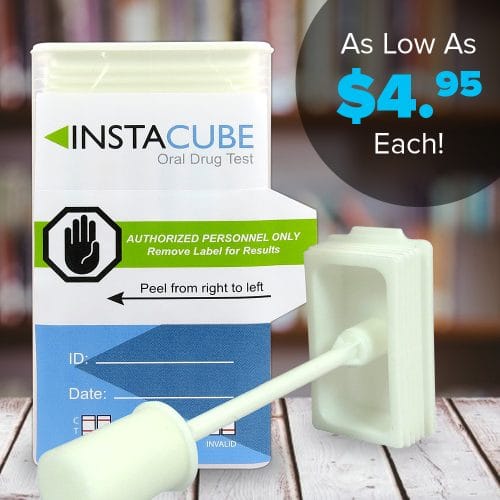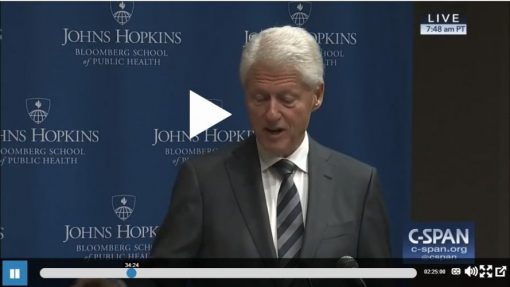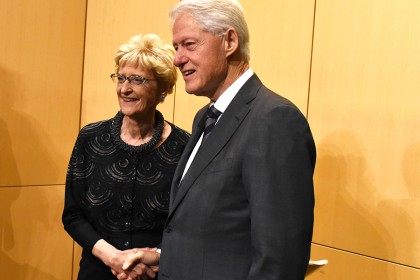The article below was first published on the John Hopkins website to detail the summit.
Published Oct 30
Among the most urgent actions the nation can take to combat the opioid crisis in America is to erase the stigma of addiction, former President Bill Clinton said Monday at the Johns Hopkins Bloomberg School of Public Health during a forum on the deepening epidemic.
Ready to order or have questions? DrugTestsInBulk.Com has a professional staff ready to answer your questions and to help you place your order today. Call us today at 866.461.7806. Ask us about our special pricing and how you can sign up to receive our newsletter and product promotions. Call Today!
“THE EPIDEMIC HAS GROWN LIKE WILDFIRE IN SMALL TOWNS AND RURAL AREAS WITH NO PUBLIC HEALTH INFRASTRUCTURE, WHERE PEOPLE DON’T KNOW WHAT TO DO, OR CAN’T DO IT IF THEY KNOW.”
Stigma prevents addicts and their families from seeking treatment and accessing resources, he said. It keeps sufferers silent, and it keeps health care providers from effectively advocating for funding for proven treatment methods.
Opioid-related drug deaths are now the leading cause of death of Americans under the age of 50. In 2016, drug abuse claimed the lives of an estimated 64,000 people, more than half of them from opioid-related overdoses. That’s more than the number of deaths caused by AIDS before it was treated, more than the number of gun-related homicides, and more than the number of deaths caused by automobile accidents, Clinton said.
Addiction has devastated a section of rural America that already has limited access to health resources.
“The epidemic has grown like wildfire in small towns and rural areas with no public health infrastructure, where people don’t know what to do, or can’t do it if they know,” Clinton said.
Monday’s event, America’s Opioid Epidemic: From Evidence to Impact, brought together public officials, health care experts, and members of law enforcement for a discussion of the opioid epidemic and solutions for a public health response. The summit also provided a discussion of a report released Saturday by researchers from the Bloomberg School in collaboration with the Clinton Foundation outlining 10 priority recommendations for combating opioid abuse.
Image caption:Ellen MacKenzie (left), dean of the Bloomberg School of Public Health, shakes hands with former President Bill Clinton
IMAGE CREDIT: LARRY CANNER / HOMEWOOD PHOTOGRAPHY
“[The opioid epidemic] is a national crisis that demands involvement from all levels of government, public and private organizations, as well as from individual citizens,” said Ellen MacKenzie, the newly appointed dean of the Bloomberg School, in her opening remarks. “Every day, nearly 100 die from opioid overdose. Over the last 15 years, the death rate from opioid overdose has tripled.”
Clinton advocated for a coordinated public health response and for a communications strategy to combat the stigma related to drug addiction.
“This is nothing to be ashamed of—it’s a problem, it’s a health problem, and we have to hammer that [message],” he said. “And employers need to hammer that [message]. They need to say ‘No, you won’t lose your job unless you’re too bull-headed to get help, to save your life, to save your family, to save your kid’s future.’ We need the same message to go out everywhere in a straightforward way.”
In a later panel discussion, a similar approach to combating stigma was championed by Tom Synan, chief of police in Newton, Ohio.
ALSO SEE
“One of the things that I think would shift [this epidemic] dramatically is to stop treating addiction as a crime,” Synan said. “Take it out of the criminal justice system, put it into the mental and medical health system. … We can’t get past any of this until we get past the part where everyone thinks the user is a criminal. They’re not.”
He added: “Stigma. It’s one of the biggest things blocking us right now.”
Other speakers at the summit included:
- Michael Botticelli, executive director of the Grayken Center for Addiction at Boston Medical Center; Distinguished Policy Scholar in the Bloomberg School’s Department of Health Policy and Management; and former director of National Drug Control Policy
- Elijah Cummings, U.S. congressman, Maryland’s 7th District
- Tom Geddes, CEO of Plank Industries
- Jim Hood, CEO of Facing Addiction
- Randi Weingarten, president of the American Federation of Teachers
- Leana Wen, Baltimore City health commissioner
- Erica Poellot, director of development at the Harm Reduction Coalition
- G. Caleb Alexander, co-director of the Johns Hopkins Center for Drug Safety and Effectiveness
- Andrea Gielen, director of the Johns Hopkins Center for Injury Research and Policy
- Carol Forster, physician director, Pharmacy & Therapeutics/Medication Safety, at the Mid-Atlantic Permanente Medical Group
Shop Opiate Tests




